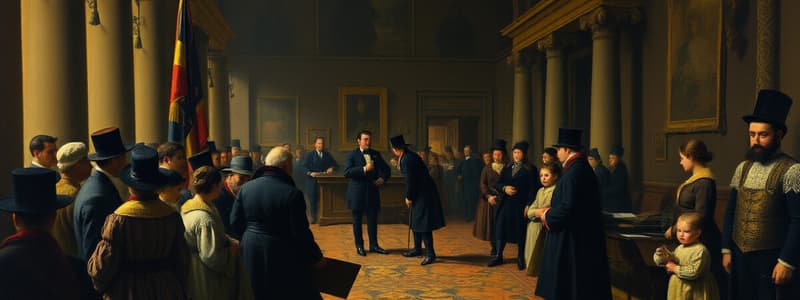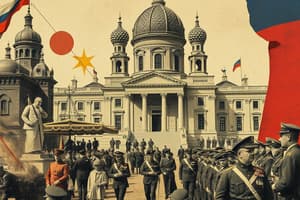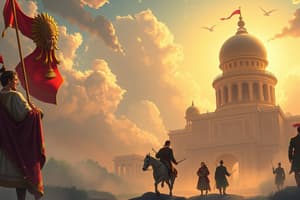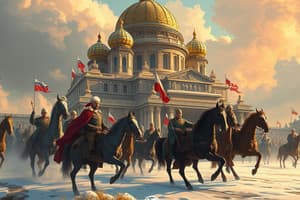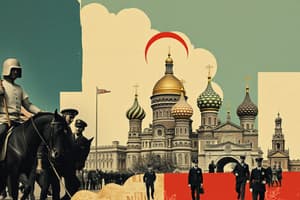Podcast
Questions and Answers
What was one of the Provisional Government's primary concerns in continuing the war?
What was one of the Provisional Government's primary concerns in continuing the war?
- To maintain economic support from western allies. (correct)
- To prevent civil war within Russia.
- To gain international popularity.
- To expand Russia's territory.
What was a significant factor that contributed to the disintegration of the empire before the First World War?
What was a significant factor that contributed to the disintegration of the empire before the First World War?
- Demands for autonomy from major agricultural areas (correct)
- Economic prosperity in the regions
- Support from the Provisional Government
- Strong leadership from Kerensky
What were the implications of ending the war for the Provisional Government?
What were the implications of ending the war for the Provisional Government?
- They would have likely gained international recognition.
- They would risk losing territory and face reparations to Germany. (correct)
- The public would immediately support their decision.
- The Russian army would become more powerful.
What was the nature of the alliance formed by the Provisional Government in 1917?
What was the nature of the alliance formed by the Provisional Government in 1917?
How did the war influence the situation in Russia?
How did the war influence the situation in Russia?
Which demand did the Petrograd Soviet emphasize regarding the war?
Which demand did the Petrograd Soviet emphasize regarding the war?
How did the public sentiment affect the Provisional Government's decision to continue the war?
How did the public sentiment affect the Provisional Government's decision to continue the war?
What was Kerensky’s relationship with the workers and peasants?
What was Kerensky’s relationship with the workers and peasants?
What was a significant paradox faced by the Provisional Government regarding the war?
What was a significant paradox faced by the Provisional Government regarding the war?
What does the statement about Bolsheviks rising to power indicate?
What does the statement about Bolsheviks rising to power indicate?
What aspect of Nicholas II's leadership contributed to the issues faced by the empire?
What aspect of Nicholas II's leadership contributed to the issues faced by the empire?
What was the potential consequence of ending the war that the Provisional Government feared?
What was the potential consequence of ending the war that the Provisional Government feared?
What shortcoming characterized the Provisional Government's approach to the war?
What shortcoming characterized the Provisional Government's approach to the war?
Why was the Provisional Government unable to effectively address the challenges in Russia?
Why was the Provisional Government unable to effectively address the challenges in Russia?
What explained the complex causes behind the October Revolution?
What explained the complex causes behind the October Revolution?
Which of the following best describes the overall relationship between the Provisional Government and the First World War?
Which of the following best describes the overall relationship between the Provisional Government and the First World War?
What was one major concern for the Provisional Government regarding the soldiers after the war?
What was one major concern for the Provisional Government regarding the soldiers after the war?
How did the war primarily affect the rise of the Bolsheviks?
How did the war primarily affect the rise of the Bolsheviks?
What role did the Petrograd Soviet play during the war?
What role did the Petrograd Soviet play during the war?
What was one reason for the Provisional Government's initial popular support?
What was one reason for the Provisional Government's initial popular support?
What sparked protests in April against the Provisional Government?
What sparked protests in April against the Provisional Government?
How did the German army's advances affect the Provisional Government?
How did the German army's advances affect the Provisional Government?
What does the term 'July Days' refer to in the context of the Provisional Government?
What does the term 'July Days' refer to in the context of the Provisional Government?
What was a significant effect of land and labor issues on the Provisional Government?
What was a significant effect of land and labor issues on the Provisional Government?
According to pessimists, what was a reason for the Provisional Government's downfall?
According to pessimists, what was a reason for the Provisional Government's downfall?
What did the Optimists argue about the impact of the war on the Provisional Government?
What did the Optimists argue about the impact of the war on the Provisional Government?
What was one aspect that the Provisional Government ignored during the war?
What was one aspect that the Provisional Government ignored during the war?
Which event exemplified the discontent towards the Provisional Government in 1917?
Which event exemplified the discontent towards the Provisional Government in 1917?
What was one consequence of the war on Bolshevik ideology?
What was one consequence of the war on Bolshevik ideology?
What key demand did protesters make that resonated with the Bolsheviks’ platform?
What key demand did protesters make that resonated with the Bolsheviks’ platform?
Flashcards are hidden until you start studying
Study Notes
Impact of the War on the Provisional Government
- The Provisional Government's fate was closely linked to the ongoing First World War, leading to challenges in governance and stability.
- Limited choices in early 1917: Continue the war for international support or disengage, risking loss of territory and credibility.
- Public demand for peace conflicted with the expectation of maintaining territorial integrity; ending the war could have spurred civil conflict.
- Continued war seen as necessary to negotiate from a position of strength, despite eventual failures, such as the June Offensive.
- Lack of electoral mandate meant the government faced significant pressure from soldiers and the public regarding war outcomes.
Opportunities for the Bolsheviks
- The war created pathways for the Bolsheviks to gain influence, previously marginal and insignificant.
- The return of Lenin, facilitated by German support, allowed the Bolsheviks to capitalize politically on the discontent caused by the war.
- Public dissatisfaction with the Provisional Government's handling of the war amplified Bolshevik slogans like "Peace, Bread, and Land."
- As the war situation deteriorated, Bolshevik support among the populace increased, particularly during protests like the July Days.
Support Dynamics of the Provisional Government
- Initial public support stemmed from the overthrow of the tsar, with hopes for peace through continued participation in the war.
- Protests in April 1917 arose after the decision to persist with war efforts, revealing discontent among the populace and pressure on the government.
- Military defeats and German advances led to diminishing support for the Provisional Government, bolstering Bolshevik influence.
Analysis of the Government's Downfall
-
Optimistic View:
- The war directly undermined the Provisional Government by creating conditions of unrest and leading to loss of popular support.
- Economic strains from prolonged warfare exacerbated existing crises related to land and public health.
- The government’s decision to continue the war proved detrimental, as it had already suffered from military and economic deterioration.
-
Pessimistic View:
- The Provisional Government was viewed as a mere continuation of the tsarist regime, unable to address underlying issues predating the war.
- Calls for autonomy by various nationalities and workers' movements reflected deeper societal discontent.
- The government struggled to maintain control amid rising power of the Soviets, which presented legitimacy challenges.
Conclusion
- The First World War intensified both historical issues and new challenges within Russia, complicating the Provisional Government's stability.
- The lack of legitimacy and the inability to tackle mounting societal demands led to rapid deterioration in authority.
- The Bolsheviks successfully maneuvered through the chaos created by the war, allowing them to rise and ultimately seize power in October 1917.
Studying That Suits You
Use AI to generate personalized quizzes and flashcards to suit your learning preferences.
